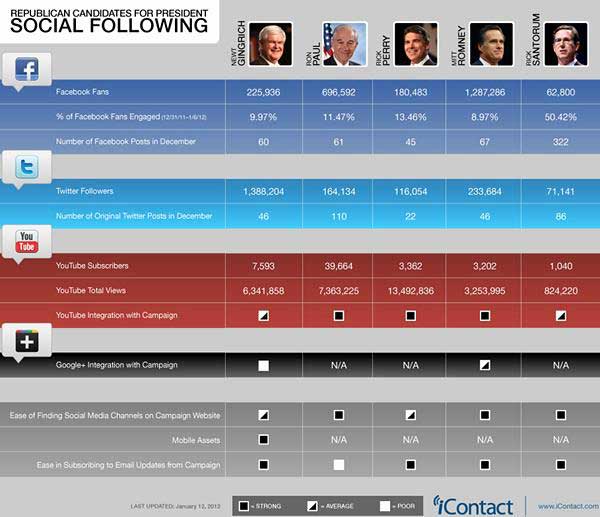Republican presidential candidates have made social media an integral part of their campaign efforts to win the White House in 2012—signing on to various social networks in hopes of reaching key constituents—and marketers can learn a lot by watching the political campaigns at work, according to a study by iContact.
The new study explores how the Republican candidates are using social media to share messages and engage voters, and offers insights and recommendations for businesses that use social media.
Below, findings from iContact's study.
Overall, Facebook is the top social platform among the candidates* studied with the largest volume of fans/followers and engagement levels.**
Interestingly, among the top three contenders—Newt Gingrich, Mitt Romney, and Ron Paul—each has a clear advantage on one of the three major platforms studied, Facebook, Twitter, and YouTube:
- Facebook: Mitt Romney leads with 1,287,286 fans, followed by Ron Paul with 696,592 and Newt Gingrich with 225,936. A skilled businessman, Romney also stands out for having a holistically integrated social campaign, according to the study.
- Twitter: Newt Gingrich leads in Twitter firepower, boasting 1,388,204 followers, followed by Mitt Romney with 233,684 and Ron Paul with 164,134.
Gingrich and Romney use Twitter less frequently than other candidates: Each issued 46 original tweets during December, compared with 110 tweets for Ron Paul and 86 for Rick Santorum. - YouTube: Ron Paul leads in YouTube users with 39,664, followed by New Gingrich with 7,593 users, Rick Perry with 3,362, and Mitt Romney with 3,202.

Facebook's strength is no surprise to the small business community. In October 2011, iContact found [pdf] that 76% of surveyed small businesses "favored" Facebook. Moreover, with more than 800 million users, Facebook has announced several upcoming changes aimed at maintaining its dominance in 2012.
Other findings related to the Republican candidates' use of social media, and the business takeaways they highlight, issued by iContact:
- Focus on quality, not just quantity: Though Mitt Romney has the highest number of Facebook fans, he has the lowest level of Facebook fan engagement at 8.97%. By contrast, among the candidates, Rick Santorum has far fewer Facebook fans (62,800), but has the highest engagement level at 50.42%.
- Content is king: Though all the candidates use Twitter, Gingrich has the highest number of followers across the network (1.38 million), more than five times the number of second-ranked Romney. Gingrich issues tweets often; but, more importantly, he appears to provide content his community wants, iContact points out.
- Google+ is still a guessing game: Only Gingrich and Romney have integrated Google+ into their social strategies. As of October 2011, iContact's survey revealed small businesses were mixed, too: 48% "favored" Google+, whereas 52% were not sure about Google+.
- A picture is worth a thousand words: Mitt Romney uses photos and videos to create content for his social properties, using multimedia content or links where fans can take action in almost every single Facebook post.
His campaign posts photos and videos from events, speeches, and commercials to help convey Romney's message to voters in a unique way. The former Massachusetts governor has also branched out into emerging platforms such as Flickr and Tout.
Similarly, Ron Paul has used his campaign's YouTube channel to amass more than 7 million clicks. - Social and email are a powerful combination: All GOP candidates have incorporated email into their marketing strategies to achieve the combined punch it provides when used in conjunction with social media, according to iContact. In addition, they have made it easy and seamless to subscribe to email and social media updates from their campaigns.
- There's is ROI for every budget: No matter the size of the campaign budget, all candidates have incorporated social media into their communications strategies. Even candidates with lower campaign funding have seen high engagement numbers across their followers, signaling that messages are resonating with their communities.
*Rick Perry was still in the GOP race on Jan 12 (when the study was conducted) but dropped out on Jan 19.
**Engagement is defined in the study as someone taking an action such as "liking" a page or page content, writing comments, sharing content, answering a question, responding to an event, mentioning or tagging the page, checking in in at a location, or recommending the page.
About the data: The iContact social media audit was conducted on January 12, 2012. Engagement levels were tracked for the week of Dec 31, 2011 to Jan 6, 2012. The findings do not reflect the political views or opinions of company. iContact's October-2011 Social Media study was based on a poll of iContact's small business customers, conducted in the third quarter of 2011.



